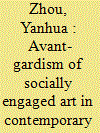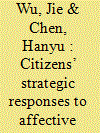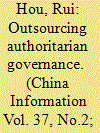|
|
|
Sort Order |
|
|
|
Items / Page
|
|
|
|
|
|
|
| Srl | Item |
| 1 |
ID:
193189


|
|
|
|
|
| Summary/Abstract |
This article sheds light on the place of avant-gardism in socially engaged art and how it is reformulated in practice, through critically examining the art practices of the Yangdeng Art Cooperatives, a socially engaged art project in a rural area of Southwest China, where artists create various collaborative artworks and site-specific projects with the local people. I argue that the project contributes to an avant-garde mode of socially engaged art through aestheticizing the ordinariness of the everyday. I term this process ‘ordinary aesthetics’. This term demonstrates potential connections in our everyday lives and redefines the relationship between aesthetics and politics by regarding aesthetics as a perceivable sensate and a distribution of the sensible. In aiming to promote the ordinary, artists engage in local residents’ everyday lives by transforming their ordinary objects, spaces, and incidents into works of art. It is art that makes their ordinariness extraordinary. Technically, the artists blur the boundary between the real and the fictional to aestheticize the everyday lives of local residents. In their practices, ordinary aesthetics consequently becomes a means to rediscover the avant-gardism of socially engaged art.
|
|
|
|
|
|
|
|
|
|
|
|
|
|
|
|
| 2 |
ID:
193188


|
|
|
|
|
| Summary/Abstract |
Previous studies on affective governance (情感治理) emphasize how the state has regulated and manipulated citizens’ emotions and psychology. This article, however, shows a different political landscape in which citizens employ emotional strategies to persuade and bargain with the government. Drawing on intensive fieldwork conducted in China from 2019 to 2020, we find that citizens deploy targeted emotional strategies to advance specific interests such as building reciprocal relations with the government, arousing political elites’ empathy, or addressing their most urgent needs. We argue that the government’s deliberate use of affective governance has, on the one hand, unexpectedly revealed and reinforced the conflict between the positive emotions that the state has attempted to exhibit and citizens’ daily experiences and, on the other hand, increased positive feelings towards the government’s efficacy in addressing citizens’ grievances. Taking rare disease patient groups as an example, this article maps and compares three main emotional strategies adopted by civil society in China, namely gratefulness, sadfishing, and dissent. By deciphering these emotional strategies, this article helps us understand the emotional synergy between state and society and sheds new light on the governance of China.
|
|
|
|
|
|
|
|
|
|
|
|
|
|
|
|
| 3 |
ID:
193190


|
|
|
|
|
| Summary/Abstract |
Decentralized court finance and personnel management practices have been criticized for breeding extra-judicial interventions and corruption in China. Determined to advance law-based governance and to constrain recalcitrant local leaders, the Chinese leadership under Xi Jinping in 2014 rolled out reforms to centralize local court finance to the provincial level with the aim to sever local courts from local influence. Despite high expectations, implementation is at best partial. Close to half of all provinces have not accomplished the required changes, and more than half of all court expenditure continues, to date, to remain reliant upon local governments. The direct reason is that provincial governments lack sufficient and sustainable fiscal capacity to finance the operation of local courts without central assistance. Different interests between major stakeholders, namely the courts and the fiscal bureaus, also add to coordination problems and difficulties in reform implementation, in particular the tension between fiscal adequacy pursued by the judiciary and fiscal management efficiency stressed by finance bureaus.
|
|
|
|
|
|
|
|
|
|
|
|
|
|
|
|
| 4 |
ID:
193185


|
|
|
|
|
| Summary/Abstract |
This article examines the practices of mediation that have become increasingly common in contemporary grassroots governance in China. The analysis focuses on the mode of governmentality embodied in the discourse on the ‘Fengqiao model’, which supplies a framework for hierarchizing and managing social conflict with the goal of keeping instability at bay. Based on 10 months of ethnographical research in various political-legal organizations within a single county, I found a grassroots governance apparatus that positions a recently invented institution – the Social Governance Centre – as the core organizational locus for coordinating a broadly distributed collection of daily operations aimed at preserving social stability. Analytically, I provide ideal-typical characterizations of three distinct conflict types – ordinary, abnormal, and tricky – to describe the discretionary decision-making by which local party-state operatives perceive and react to social conflicts based on their implications for the value of social stability. Drawn from conversations in the ethnographic literature on policing, this study of street-level mediation contributes to our understanding of how social conflict is rendered policeable, and it provides a case study of the use of mediation as a mode of police work in an authoritarian context.
|
|
|
|
|
|
|
|
|
|
|
|
|
|
|
|
| 5 |
ID:
193187


|
|
|
|
|
| Summary/Abstract |
How does privatization impact authoritarian governance on the frontline? This article examines the impact of outsourcing on the labour process involved in the operation of mayors’ hotlines. The mayor’s hotline system is a channel set up by Chinese municipal governments to address residents’ suggestions, appeals, inquiries, and complaints. While the expansion of mayors’ hotlines falls under the government in China, the operation of call centres has been outsourced to professional tele-corporations; thus, it is for-profit companies and their employees that represent the state in communications with the public. By examining both the practical and relational components of call operators’ labour process, this article looks at how an institution of responsive authoritarianism has been contracted out in China. It argues that the outsourcing creates a dual-pressure structure that shapes the frontline governance of this institution. The engagement of privatization in authoritarian domination leads to a conflict between market rationality and the inherited tradition of state intervention.
|
|
|
|
|
|
|
|
|
|
|
|
|
|
|
|
| 6 |
ID:
193186


|
|
|
|
|
| Summary/Abstract |
Since the outbreak of the COVID-19 pandemic, the authorities of Serbia have undertaken a concerted effort to secure China’s support in containing the coronavirus. This asymmetrical cooperation, apart from aspects concerning health security, has allowed both sides to obtain considerable political and economic benefits. This article examines how China and Serbia utilize pandemic cooperation to pursue and realize their wider foreign and internal policy goals through patron–client ties, as well as highlighting the pitfalls of this kind of relationship. Although the outbreak of the pandemic and the medical cooperation that followed do not constitute a turning point in the well-established relations between the two countries, the article argues that pandemic cooperation has considerably strengthened relations. In many ways, the pattern observed by the authors resembles China’s pandemic exchanges with other countries, especially smaller states with authoritarian inclinations.
|
|
|
|
|
|
|
|
|
|
|
|
|
|
|
|
|
|
|
|
|